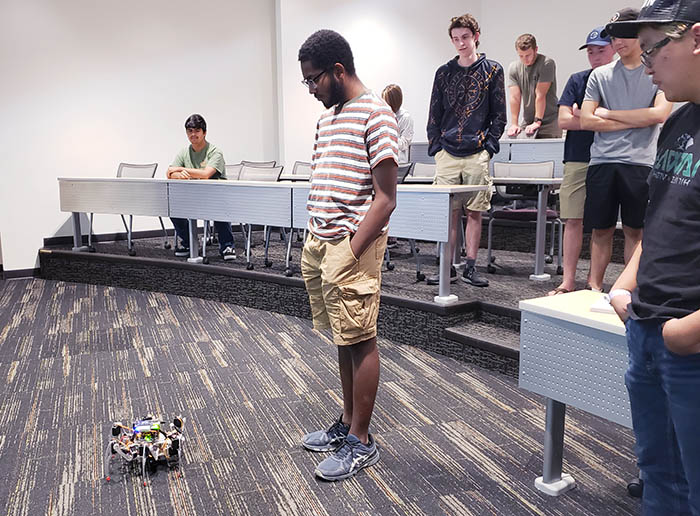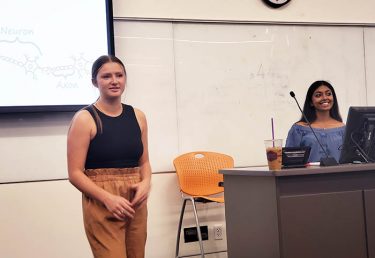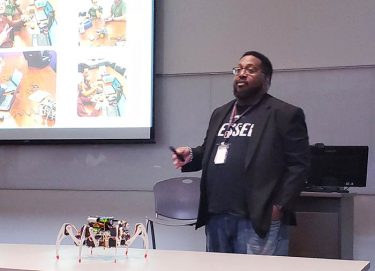
By Lana Sweeten-Shults
GCU News Bureau

Linnu Shaji wasn’t supposed to be doing pediatric brain cancer research. She wanted to be a nurse.
But then the Grand Canyon University senior took a biology class and that was it.
“I switched out of nursing. I LOVE biology,” said Shaji, a pre-med major, her eyes gleaming as she spoke about her passion for research at Saturday’s STEM Research and Development Workshop. “I love figuring things out.”
Shaji spoke to high school students in one of the workshop’s many breakout sessions about her pediatric brain cancer research, which she conducts under the leadership of mentor and principal investigator Dr. Madhavi Chakravadhanula.
One of the papers she is working on is looking into the effects of a plant-based diet and how that may play a protective role during pregnancy, particularly on the brain development of a fetus. Evidence suggests that dietary vitamins and plant pigments during pregnancy can contribute to reducing the risk of childhood cancer.
Shaji has been investigating certain dietary compounds, such as anthocyanin and carotenoids found in leafy vegetables.
She said what’s exciting for her is sitting in her classes and seeing concepts click.
“I’m taking biochem this semester. I see how these cells are forming and what things are happening so cancer can be reduced. You start to understand why things work against these things,” she said.
What she didn’t realize when she stepped on GCU’s campus was that she loves connecting the dots.
Now she plans on taking a gap year to do research before heading to medical school, where she will study to become an oncologist.
Shaji was just one of the student speakers at the STEM Research and Development Workshop, sponsored by the campus’ STELLAR research group and organized alongside partners K12 STEM Outreach and Discover GCU.
About 150 high school students -- some who flew into Phoenix for a Discover GCU trip, some who came to campus because of their research interests -- attended Saturday’s session.
“We’re focusing on presenting to students the unique opportunity that they have, one, to get involved in research but also how to use their skills to be involved in business because, really, research is involved in business, too. We’re just trying to show that to students and what sets GCU apart,” said mechanical engineering technology sophomore Nathan Olsen, STELLAR co-founder.
“The biggest thing is to try and give exposure to students who might be interested in doing research,” said Kacey Carvajal, Program Recruitment Specialist. “A big reason why we do this is to help grow opportunity and to showcase what GCU has to offer to students who are coming to or are interested in coming to school here as far as research opportunities. … They can get involved in all this stuff beginning their freshman year."
Much of the workshop focused on the University's Research and Design Program, which gives undergraduate students research opportunities – opportunities that might not be available to them otherwise until graduate school.
Biology/pre-med major Jordyn Oliver, who co-presented with Shaji in the pediatric brain cancer research session, knew she wanted to delve into research as soon as she got to campus.
“My cousin was doing research. She applied to medical school, and she 100% recommended joining an RDP group and just seeing what it’s like in lab and getting your feet wet,” said Oliver.
“It’s really nice here at GCU because they give you the flexibility to choose what you want to do. There are so many available research projects to go into. It’s really nice you get to pick and choose what really interests you. I recommend it to anyone.”

Jevon Jackson, Program Lead for the Software Engineering Program in the College of Science, Engineering and Technology, also showcased the research possibilities at the breakout sessions, which also included anatomy and dissection, microbial biology, the Antimicrobial Discovery Lab, and biomedical engineering and the work at LaBelle Labs to help entrepreneurs design and prototype medical products.
“You guys have all the power” to decide what to research, said Jackson, who is the principal investigator along with Head of Technology Programs Rob Loy of the Computational Artificial Intelligence/Machine Learning & Robotics Lab.
Students in the lab spend four hours a week outside of class time learning the different “flavors” of machine learning and working on projects.
“We solve complex problems of making machines come to life with your code. That’s what it’s all about,” Jackson said before students demonstrated some of the robots they’ve programmed, one that looks a bit like a praying mantis and high steps, prances and dances.
He shared how students have coded and deployed solutions on everything from AWS Deep Racer vehicles to robots and cars and spoke about facial recognition and more.
“You can be any major to become part of this program,” Jackson said. “As long as you have a passion and ability to want to learn, you can come in and participate.”
Besides joining RDP or going into medical device development at LaBelle Labs, students also can develop their own groups, like STELLAR did. The student-formed club serves as a platform for students to design, test, build and launch projects to the International Space Station. Students in the club do research with a missional vision. Ultimately, they want to help people around the world.
The group is preparing to send a microbial fuel cell it developed to the International Space Station in 2022.
“A big goal of this event is to get students excited for research and for what kind of research development can be done as college students, so I think a big takeaway is just for students to see that -- to see what can be done, see what’s possible,” said junior government major Madeline Landes, an Honors College student and the STELLAR group’s Director of Outreach. “I think it’s cool how STELLAR is a completely student-run program and club. So another big takeaway is students getting excited for doing that kind of research coming right from high school into college, because that’s definitely what our club members have done.”
Students at the workshop also heard about the business side of research. Robert Vera, Director of GCU’s Canyon Ventures Center for Innovation and Entrepreneurship, spoke about what research can do for the economy. And students learned about protecting their research, business projects and intellectual property.
For Shaji, research epitomizes what she has embraced the most when it comes to her academic journey and what awaits her as she moves on to the next steps in her career.
“For me, I love it,” she said about research. "I love learning.”
GCU senior writer Lana Sweeten-Shults can be reached at [email protected] or at 602-639-7901.
***
Related content:
GCU Today: Symposium/Showcase shows range of research
GCU Today: Save the rainforest: GCU plant researchers may help
GCU Today: Virtual museum, other VR projects exhibit promise
GCU Today: GCU's finger of the pulse of firefighters' health



































































